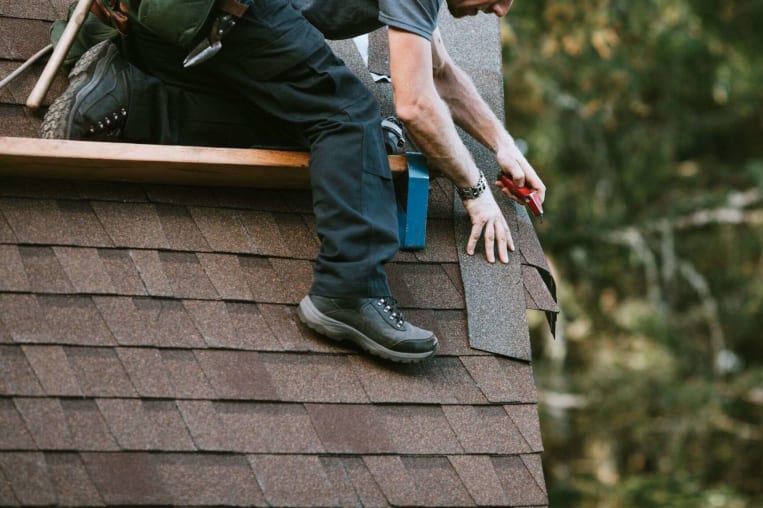
BBB Tip: Hire a trusted roofing contractor to repair, replace roof

What you'll learn:
-
Key tips for hiring a roofer: Learn what to ask and look for when choosing a roofing contractor, including licensing, insurance, written estimates, cleanup plans, and protection against weather and property damage.
-
How to protect your investment: Understand what a detailed roofing contract should include, from materials and scope of work to warranties, payment procedures, and debris removal.
-
Ways to extend your roof’s lifespan and avoid scams: Get practical maintenance tips and learn how to spot and avoid roofing scams, especially after severe weather.
Updated May 28, 2025 with refreshed tips
7 tips to consider when hiring a roofer:
- Rely on research and referrals. Replacing a roof is no small investment. Ask for recommendations from your friends, family, or neighbors. You should also verify that the roofing contractor has the proper licensing (if required by your state) and insurance.
- Make sure you understand the full scope of the project. What exactly is the roofer going to do? Will they be doing spot repairs or replacing the whole roof? Will they be removing the old roof or covering it with the new roof? Ensure you understand the solutions' pros and cons and that everything is detailed in your contract.
- Ask about clean-up and waste removal. Confirm that your contractor will be responsible for taking away all old materials and cleaning up your site after their work is complete.
- Consider your gutters and landscaping. A roofing job will require ladders that can cause damage when leaned against your gutters or stuck in your landscaping. How will your roofer protect against damage or fix things after the job?
- Plan for bad weather. What happens if there is bad weather while your roof project is underway? Ask your roofer about what they will do to protect your home in the case of rain or snow.
- Check your insurance coverage. If your project is for fixing the damage, check your homeowner’s insurance to see if your project is covered and how you should proceed if it is. (You also want to check your contractor’s insurance coverage for worker’s compensation, property damage, and personal liability.)
- Different contractors for different roofing systems. Roofing contractors may be certified to install specific types of roofs. You can check with the manufacturer to see if your contractor is certified for their system.
- Be sure you hire a contractor you trust. Check BBB.org to see if your roofer is BBB Accredited. Check reviews and make sure the company is licensed and insured.
Clearly written proposals that are detailed and broken down into separate line items are a good sign that the contractor is thorough and has prepared an accurate estimate.
Your estimate or proposal (and later your contract) should include the following:
- The type of roof covering, manufacturer, and color
- Materials to be included in the work, e.g., underlayment, ice dam protection membrane
- Scope of work to be done
- Removal or replacement of the existing roof
- Flashing work, e.g., existing flashings to be replaced or re-used, adding new flashing, flashing metal type
- Ventilation work, e.g., adding new vents
- Who is responsible for repairing/replacing exterior landscape or interior finishes damaged during the work?
- Installation method
- Approximate starting and completion dates
- Payment procedures
- Length of warranty and what is covered, e.g., workmanship, water leakage
- Who will haul away the old roofing materials and/or project waste (e.g., extra materials, packaging, etc.)? Is there an extra charge for this service?
Ways you can help extend the life of your roof:
- Clear dead or overhanging branches. Have a professional tree service evaluate the branches hanging over your roof and decide whether or not they are a risk. If the branches are dead, that increases the chance of them falling onto your roof. In addition, heavily shaded areas of your roof can retain moisture, which sometimes leads to mold. Regular trimmings of overhanging branches will help your roof dry uniformly.
- Inspect for hail damage. After strong storms, especially hailstorms, have a licensed insurance adjuster or contractor inspect your roof. Dimples and cracks on the shingles are key indicators that hail damage has occurred.
- Keep your eyes and ears open and remove debris. Homeowners should inspect their roofs regularly and monitor for hail damage. The homeowner can do ground-level inspections. You should also keep your gutters clear. If debris needs to be removed, call a professional or be very cautious when getting up on your roof.
Roofing scams often occur after a storm when a roofer “just happens” to be on your street and notices damage to your roof. Learn more about these so-called "Storm Chasers" at BBB.org/Storm. Another approach is to knock on your door and tell you they have extra shingles or roofing from another job and can offer you a good deal. Always look for the BBB Seal and do your homework to be sure you are hiring someone you can trust.
For more information
Check out our roofing HQ for all the help you need when hiring a roofer.
Learn the steps to hire a contractor at BBB's home improvement HQ.
Find trusted, vetted roofing pros near you and get a quote: Roofing contractors near you. Look for the BBB Seal. It's the Sign of a Better Business.
Still Need Assistance?
Contact Your Local BBB
Your local Better Business Bureau can assist you with finding businesses you can trust. Start With Trust®.
Additional Resources
Let BBB help you resolve problems with a business
Research and report on scams and fraud using BBB Scam Tracker
Learn more about the value of BBB Accreditation